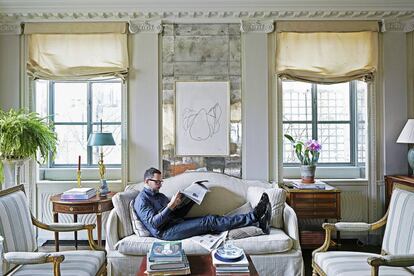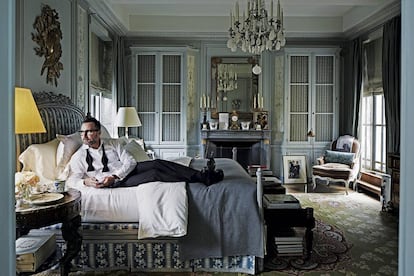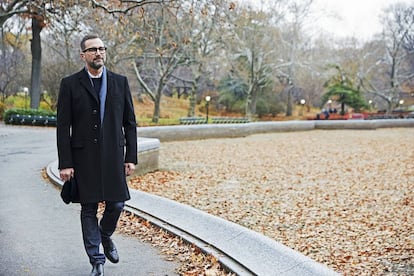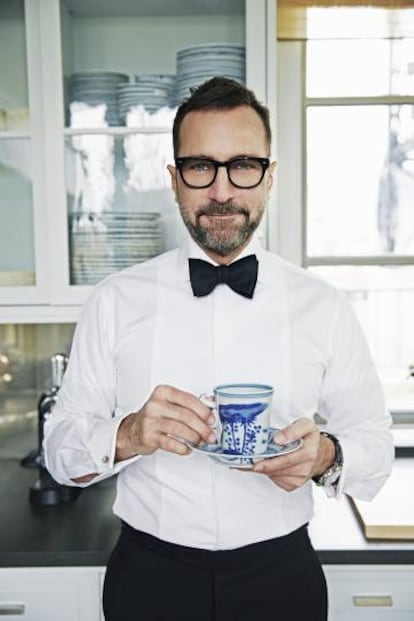Hasta la vista, Mr Ambassador
The former diplomatic chief for the United States in Spain, James Costos, is returning to New York after having transformed the social life of our country

It was close to Thanksgiving in 2012 when James Costos (Lowell, Massachusetts, 1963) got a call in his office at the cable television network HBO in Los Angeles. “We are calling you from Air Force One. Please hold to speak to the president.” Costos thought that the world leader wanted to thank him for his participation during the electoral campaign that had seen him voted back into office. “It was an incredible moment,” he explains. “I looked down at my chest and I could feel my heart beating. As we already knew each other, I started to ask him about his last trip and his family. But he stopped me, he had something to ask me: if I wanted to form part of his team as an ambassador. I immediately said yes, and he transferred me to Valerie Jarrett, his senior advisor. She told me that someone would call me the next day and that the process would start.”
After months of painstaking research into his past, which included even his most inconsequential relationships (“You’re very boring,” joked Obama after looking over all the paperwork), the process culminated with the naming of James Costos as US ambassador in Spain in August 2013.
The mission came to an end on January 18, two days before the change of government in his country took place in Washington. After meeting with Spanish Prime Minister Mariano Rajoy at his last official act, the now ex-ambassador to the US in Spain, James Costos, has just begun his journey back home. He is leaving behind an experience that has changed his life, and that has left its mark on our society, politics and culture like no other diplomat has managed to do before. The activities of Costos and his partner, the interior decorator Michael Smith, have been frenetic, in all areas. Among their achievements were bringing Barack and Michelle Obama to Spain (albeit separately), as well as Daenerys Targaryen, whose fictional adventures in Game of Thrones are being filmed in our country by his former employer HBO.
Although Costos had studied political science, he had never worked in this area. His relationship with the Obamas stemmed from the work of Smith, who was hired by the couple to decorate the White House during the president’s first term. “A personal relationship was established, as happens with many of Michael’s clients,” Costos explains. When the first lady visited the West Coast, in the midst of the president’s election campaign, the idea came up of organizing a fundraising event. “We had only ever done something similar for philanthropic causes,” Costos explains. Their success was such that the campaign team soon asked them to work on similar events. Costos wanted to do more, and got involved in door-to-door campaigning, trying to secure votes in places where Obama enjoyed less support, such as Jacksonville, Florida, where his parents live.
We opened up the embassy in search of a cross-pollination with Spanish civil society. That part of our activities was not properly understood James Costos
The summers that Costos and Smith spent in Mallorca over a 10-year period help to explain why Spain was the destination chosen for them by Obama. The new ambassador ignored superstition, and arrived in his new adoptive home on September 13, 2013, a Friday no less, and chose the same supposedly unlucky day for his leaving party, in January 2017. Between these two dates, his residence in the Castellana boulevard in Madrid became a meeting point for entrepreneurs, artists, politicians, journalists, movie directors and members of the military. It became a place where the art of hospitality reached heights not seen for decades, and where scenes more akin to an F. Scott Fitzgerald novel were seen, rather than those of today’s glossy magazines. “One of the first decisions we took was to use the ambassador’s residence as a platform to connect with the Spanish community and look at it as an opportunity to invite Americans to visit Spain, and thus promote tourism.”
Sarah Jessica Parker, John Kerry, Harrison Ford and Martha Stewart are just a few of the illustrious and diverse visitors to a house that, having been refurbished by Smith and with a stunning collection of contemporary art, also became a space for culture. A bastion for cultural diplomacy, one that Costos defends. “Michael and I wanted to open up our home in the same way that the Obamas had opened the presidential house in Washington. We started to invite people from the worlds of culture and politics and we sought a cross-pollination with Spanish civil society. If we received a visit from a business leader, we would mix it with members of the military, artists, designers or doctors. Before, the parties in this area were very much focused on different sectors. We broke with the protocols, something that sometimes caused confusion and surprise. But everything that we did here was thought through.”
Recognized as the best hosts in the capital, they developed social activities that always masked a determined purpose under an effervescent surface. This is something that was not always reflected in mundane news stories, which, above all else, trivialized the couple’s nocturnal schedule. “I think that to start with that part of our activities was not properly understood,” Costos says. “I had to clarify several things. And we started to talk about those parties and receptions as events with a purpose and meaning. There were strategic reasons for every one of them. And every person who was invited had been carefully chosen. It was a pleasure to find myself in my home with people I didn’t know and see them interact with other people with whom they could establish an advantageous relationship. This is the power of this platform. The aim of foreign policy is to get to know other cultures and ways of thinking and to learn from it. It’s about knocking down walls and barriers and building bridges, friendships and alliances.”
Michael Smith, who as well as decorating also served as an art curator for a number of pieces that could speak to the link between Spain and the US, remembers it like this: “When we arrived the ambassador’s house was not so open. Part of the work was about making it into something that was alive, into an attractive place for the worlds of business, fashion and architecture. The plan was to represent all the facets of our country (and not just the economic, military or political) and that our residence was a magnet for different people who wanted to visit Spain. And we feel proud that artists, actors and high-ranking dignitaries did so.”

Lacking a manual to explain how to be a good ambassador, the actions of Costos were guided by the advice that the president gave him when he was named. “Be yourself,” he told him. “Travel, try to meet as many people as you can and transmit the message that our politics are inclusive.”
That is why Costos likes to say that all his previous experience helped him to come up with his innovative style of diplomacy. “Three-and-a-half years ago, I arrived here without knowing how to be an ambassador. And… I still don’t know,” he jokes. “That’s the beauty of this work. When you touch down, you come with a lot of information. I spent six months in Washington and I learned all I could about the relationship between the US and Spain and about the job. Besides, you have a team of 400 people who know inside out how things work. What you need to do in this position is to maintain the military, economic, and political alliance between your country and the country you are sent to, but each person finds their own way of achieving this. You have the chance to design your own aims and activities and guide them toward areas in which you feel you can make the biggest impact.”
One of Costos’s main focuses has been the realm of start-ups. In 2015, he started the InCubed or IN3 project, that aimed to bring together innovators, institutions and investors after a group called Chamberí Valley met at the Embassy. “The lack of entrepreneurial spirit is a general problem in Europe and is a cultural question,” says Costos. “It has to do with the idea that your life is predestined because your path has already been defined and if you diverge from it, things get complicated. But this isn’t so and my own experience is testament to this. Allowing people to have a spirit of entrepreneurship is good for the whole country.”
True to his philosophy of breaking molds, Costos went out of his way to get young people together with their ideas for a startup with the leaders of big companies. “Sometimes people close up because they are scared and they are skeptical of people starting new things because they fear they will be replaced. In America, we believe that experience and innovation should go hand in hand and be better for it.”
Costos is the kind of guy who is used to changing his suit, as well as the skin he is in. And now he is about to do so again. That call from the president of his country changed a TV executive into an ambassador but he had already performed this kind of transformation before. That’s why he tends to use his own story in startup forums.
His first transformation took place when he moved to New York to find himself, after graduating from the University of Massachusetts. The only son of a family of Greek immigrants, he had never spoken to his loved ones about his sexual orientation. “I grew up in a very small city and I didn’t know what they would think,” he says. “In New York, I started to understand myself better and I started to date. But I felt very detached from my family and I missed them. I wanted to share what was happening to me and my newfound happiness with them. I told them by phone and they told me to come home. They were incredibly honest. The only thing my father reproached me for was that I had taken so long to tell them. ‘It’s not what we were expecting or what we had in mind for you,’ they said. ‘But if that is your choice, we respect it. You are our son and you always will be.’ They hadn’t suspected anything, but they reacted swiftly and in the best possible way.”
It wasn’t the only change that Costos underwent in New York. His first job in the city was to select computer analysts for financial institutions, and he did so well that he managed to set up his own company. But he felt “very bored” not being with people who shared his interests. He thought fashion could be a more appropriate sector for him – “a place I could have greater freedom of expression and be surrounded by creative people.”
Costos was guided by the advice that the president gave him when he was named. “Be yourself. Travel, try to meet as many people as you can and transmit the message that our politics are inclusive”
So he continued to work in his company during the week and at the weekend he looked for another job. As he wasn’t sure where to start, he went into Fendi on Fifth Avenue and asked to speak to the manager. He was very insistent, explaining that he wanted to learn how fashion worked. The manager was surprised, but since Costos would only be paid on commission there was no risk involved in taking him on. “I convinced him and it was a success,” recalls Costos, who had discovered a line of work he felt passionate about. Some time later, he decided to become involved in fashion full-time and he took a position as head of sales in the accessories company Ghurka and went on to be headhunted by the Italian company Diego Della Valle. For 10 years, he oversaw the expansion of Tod’s in America, opening 10 boutiques and more than 20 corner stores.
He went from Tod’s to Hermès, but in the midst of the move, 9/11 happened and Costos decided to reinvent himself again. After a long-distance relationship of two years with Smith, who lived in LA, Costos moved to California to be with him. “I plucked up all my courage and left Hermès and New York without another job,” he says. He thought he would find another position in fashion, but the sector on the West Coast was much less global and he didn’t feel mentally prepared for the business of jeans and swimwear.
“I was in Hollywood and what moves money there is the entertainment industry,” he says. “I could see that was where my future lay and not in fashion. I had to find the thread that connected the two.”
A friend of a friend, an executive at DreamWorks, met him and gave him a piece of advice that would stay with him. “She told me that at the end of the day, what I did in fashion was the same as what they did in film. Sell products. ‘You sold shoes and bags; we sell cinema tickets.’ It is a phrase that really stayed with me,” he says. With renewed enthusiasm and a couple of successful interviews, he began work at the startup Revolution Studios and moved from there to HBO.

Fashion still has a special place in his heart and because of this, his friend, the editor of US Vogue, Anna Wintour, came to visit him in Spain and was introduced to the most distinguished figures from the Spanish fashion industry. “I’ve always cared about what I wear,” he says. “I have two sisters who were really interested in clothes and a lot of the conversation at home revolved around the subject. We are from humble background, so we weren’t talking in luxury terms. But my parents had drummed it into us that we should respect ourselves and look after our appearance and go out into the world making the best impression possible. My family always dressed me very well and later, when I bought my own clothes, I also put a lot of thought into it.”
This is something that Alberto and César, sons of Spanish suit maker Manuel Calvo de Mora, can confirm, having tailored around 25 outfits during his stay. “A good suit offers security and that is what we have tried to convey,” they explain. “In the photos published in the media, Costos can be seen wearing his suits in a very elegant and natural way with a certain Spanish duende [spirit]. He likes to be cutting edge but without standing out. Always very correct and elegant. As far as his suits are concerned, he has managed to choose fine quality fabrics and a classic style. It is in the cut of the suits that he has dared to be more fashionable, opting for a tighter fit. He keeps himself fit and he can carry it off. He likes to feel the jacket on him.”
If the Costos period at the embassy has been characterized by star appearances, there have been none to top the visit made by Barack Obama himself. The first president of America to have come to Spain for 15 years, he unfortunately had to cut his visit short due to a shooting incident involving police officers in Dallas in July 2016. “Even so, it was a historical event,” says Costos. “In the State Department, we like to say that a visit from a president is the most important honor you can bestow on the host country. We did that and it helped to highlight Spain’s importance as a world leader.”
The three-day visit was reduced to little more than a 24-hour whirlwind tour between Madrid and Rota, during which the Obamas charmed their hosts with anecdotes of their first visit to Spain while backpacking, as well as expressing gratitude for the military alliance that unites the two countries. “Meeting the military staff and their families in Rota and Morón is one of the most crucial aspects of the collaboration,” says Costos. This is also an aspect that relates to Costos’s own background. His father and three uncles served in various armed forces following the death of their parents. “My father never talked about his time as a marine,” says Costos. “He served for 18 years and then he changed job. It wasn’t something that touched my life until I started this role. When I was named ambassador, I knew there would be an important military component and I began to speak to my father about his experience. He was a security guard in Camp David during the Truman presidency and that earned me immediate respect from the Marines.”
During Obama’s visit, Costos wanted the president to understand how the mission he had entrusted him with had changed his life. “I thanked him for allowing me the experience of serving other people,” he says. “I don’t know how I will substitute this experience when I return to the private sector. Each decision I made in the last three years has had a specific aim of bolstering the relationship between America and Spain, which is to say something much bigger than me. In the next chapter of my life, I want to focus on something that will allow me to have an impact on the lives of others. It’s not just about philanthropy, something that I will continue to develop according to the former president and first lady’s agenda – climate change, education for girls, enterprise and technology.”

Costos has been offered a job on the management board of a prestigious international investment bank with offices in Madrid. But it is unlikely that this will be his last reinvention. When he talks with pride about the value of hard work and overcoming obstacles that his parents gave him, and when he tells the story of a man who emerged from a small city and tried to abide by his family’s principles to triumph in the world of fashion, the entertainment world and the diplomatic core, the conversation turns to the possibility of becoming a father himself. “Michael and I have talked about adoption,” he says. “We thought about it, but we’ve always been concerned whether having children will work with having such busy lives. We are very competitive with each other and with ourselves. And we are worried about how to bring all this together. Obviously, people manage it. But we are not there yet. We haven’t found the right way to do it. We still have some pages to turn but the matter remains open.”
At the moment, his country is facing an uncertain period under the leadership of Donald Trump. The arrival of the new president prompted Costos to leave his post at the embassy before his remit had run its course, since all political positions were excused the day Trump was sworn in. There is no date yet for the next ambassador to fill Costos’s shoes, something which could take as long as nine months. “I’m not going to speculate on what Trump is going to do in the US, let’s wait and see what happens. We hope it will be the best for everyone. It has been a very polarized campaign and there are people who feel very anxious about the change. Let’s hope their worries and fears disappear.”
The world feels a scarier place now compared to eight years ago, when Obama won the election thanks to message filled with hope. “Many politicians could say the same things as Obama did,” says Costos. “But the important thing is to feel that level of compassion and sincerity that makes people believe in you and follow you. President Obama always defended the idea that we could all grow together without producing winners and losers. He has always looked for consensus and empathy. There are people who say that this has stopped him from achieving his aims but he believes firmly in it. This, for example, is a philosophy applied to allies such as Spain. The work that Spain and America have developed under President Obama’s mandate was aimed at being mutually beneficial. And this is his way of understanding foreign policy across the world.”
Of all the places that the Obamas could have chosen to spend their first days outside of the White House, they opted for the property Costos and Smith own in Palm Springs
Costos’s mission is over, but not his relationship with Spain, where he will continue to have links. Apart from the job offer at the investment bank, he is exploring other opportunities related to the country, and the possibility of establishing a residence in Madrid. “What seems really exciting to me about the stage that I am starting now is to see how the relationships that I have started in Spain develop. I am going to return to the world as a citizen and try to create links with the people with whom I have shared a fleeting instant. I want more of their friendship.”
In a completion of the circle, this chapter came to an end on the plane from which the phone call that changed his life was made. Costos and Smith were on the last flight that Air Force One took with the now ex-president on board, after the inauguration of Trump. The flight was headed to California. Among all the places that the Obamas could have chosen to spend their first days outside of the White House, they opted for the property Costos and Smith own in Rancho Mirage, Palm Springs. There they spoke about Spain and the admiration that the former president of the United States has for the country. While there, Obama received a call from Spain’s King Felipe VI, with whom he has forged a strong friendship. Perhaps, who knows, this summer we will see the Obamas visit the king and queen in our country. But there is no doubt that the person who will be enjoying a spell in Mallorca is James Costos, who, whatever the future might hold, has already found a place where he can retire.
English version by Heather Galloway and Simon Hunter.
